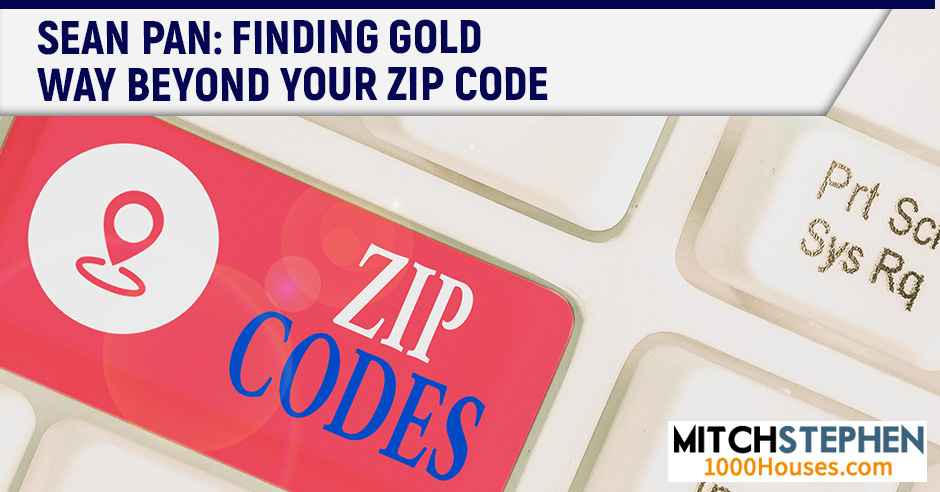PODCAST
Sean Pan: Finding Gold Way Beyond Your Zip Code


Mitch Stephen chats with
Sean Pan
Episode 441: Sean Pan: Finding Gold Way Beyond Your Zip Code

If you do not challenge your comfort zones and try new things, success may have a hard time finding your way. The same goes for investors, and going out of their zip code is one thing to consider to discover the best possible deals. Sean Pan shares with Mitch Stephen how he managed to do this exact endeavor by going beyond expensive California and acquiring properties in more reasonably-priced Florida, Georgia, and Texas. He also shares how he leveraged the internet to start this efficient passive source of income, from finding a property in Auction.com to hiring his team members through BiggerPockets.com.
—
Watch the episode here
I’m here with Sean Pan. He’s over in the San Francisco Bay Area but we’re going to be talking about how to invest from afar, in other cities, someplace where prices of houses are a little bit more reasonable than they are where you’re at. Sean is definitely in a very expensive town, San Francisco. It’s interesting because if you learn to invest and build a business from afar then you’re building a real business which is one that you work on instead of one that you work in. I got to pay homage to my sponsor. LiveComm.com, lead generation plus mass texting equals success. There’s a reason why I have nine days on the market. My house is on average 15% down it’s because of LiveComm.com and a few little other ideas attached to it and check it out. We paid the bill. Sean, how are you doing?
I’m doing great. Thanks for having me on the show, Mitch.
Are you sitting in the San Francisco Bay Area?
This is my house in Milpitas, California. It’s about one hour south of San Francisco.
Still expensive, I imagine.
Relative to where you are.
San Antonio used to be one of the most affordable housing places in the world. When I started out years ago, you could buy a house for $12,000, $13,000, $15,000 or $20,000. I bought my first 100 houses on credit cards, believe it or not.
I wish I could do that here.
I have hundreds of thousands of dollars on my credit cards but they were all 0% introductory offers. I didn’t owe any money and I occupied the property until I flipped it. I ran the payment down to the cards and didn’t have to pay anything for the money. You’re a young man. Sean pointed out that there are people getting into this game that are 18, 19 and 20. If I had my head far up my butt when I was eighteen. It wouldn’t even be funny to talk about. Tell us a little bit about your background.
My name is Sean. I’m based here in the San Francisco Bay Area. It’s interesting because I wasn’t into real estate when I was eighteen years old. I went to high school and thought that you should go to college and then get a good job. Work there for 30-plus years and then retire. That’s not what happened. I ended up going to college for a degree in Electrical Engineering. I studied hard and I got a good job but seeing my co-workers every single day and how unsatisfied they were with their lives, made me think that, “Maybe this isn’t the place to be. What else is out there?” That’s when I started looking at different books, I started listening to podcasts, even the BiggerPockets podcast to learn more about different types of businesses to get into.
As you try several different businesses to try to earn that financial freedom, a lot of them didn’t work out. I was now selling selfie sticks on Amazon. I was trying to write eBooks. The only thing that worked out for me was going to real estate. It made sense that you could buy a property, have it cashflow, pay your residual income and live off that passive income for the rest of your life. That’s what I did. In 2016, I moved from Los Angeles back to the Bay Area. I was working a decent job at Capitol.
I started attending these meetup groups. From the meetup groups, I learned more about how to invest in real estate and that’s when I started buying my first rental properties. That led me down the path of being a real estate investor. In 2018, I left my engineering role to go into real estate. That’s where I am now. I host a podcast, I have a meetup group, I invest out-of-state and I flip houses locally in the Bay Area.
You said you started attending all the meetups, books, tapes and seminars or whatever then you bought your first property.
I realized I didn’t want to be an engineer after the first year of working full-time. I realized, “This is not where I want to be.” Since then, I tried all these different things and it made me took about four years of casually browsing the internet, going to several meetup groups to purchasing my first property. It took me four solid years of waiting and learning.
That’s enough time to find where you fit. Do you still have that same rent house or have you sold it?

Zip Code: If you have passive income coming in, you can afford to take a lower-paying job if you want to.
I still held those properties. They are cashflowing nicely. The beauty of owning these rental properties is that it allows you to do what you want to do. Most people have their jobs and they sometimes work at those jobs, not necessarily because they want to but it’s because of the only thing that they have. They’re scared of giving that up because they don’t know if they’ll get another job and pay as well. If you have rental income or passive income coming in, you can afford to take a lower-paying job if you want to, if it makes you happier.
I took a little bit different approach. I took having a job off the table because I figured I was going to put myself in a corner so bad that I would have to figure it out or I would starve because I believe that the body is the most adaptable thing in the world. As long as you have enough water, enough protein and your mind doesn’t go awry, it will figure everything out. I painted myself in a corner. Do you have family, kids or single?
I have a live-in girlfriend but no wife, no kids yet.
The only reason I say that is because of the statement I made. I painted myself in a corner. I didn’t have a job and I woke up the next morning and said, “You can’t have a job. What are you going to do?” My first goal was no job, you eat. That’s a lot easier to do if you’re by yourself, on your own or someone is not depending on you. I had that luxury that I knew I could sleep on the floor, I could eat beans or whatever I needed to do but it’d be hard to ask a whole family to do that. Are these rental houses in the San Francisco Bay Area?
They’re not. Honestly, I wish I could afford to buy a rental property in the SF Bay Area and hold onto it. In the Bay Area, the starter homes start at $1 million, 1,250 square feet, three-bedroom, two-bath, built in the 1960s. They’re all in these strange foundation areas so we have cracks all over the home. My house is a prime example of that. Again, $1 million for this. In San Antonio, that same house you’re talking about for $12,000years ago, now it’s $100,000 or$150,000.
Maybe $200,000.
Ours is five times more expensive.
How do people do it?
They do it because the jobs here pay so much. If you figure two people working in a high-tech company like Google or Apple, they could be making $200,000 as a base salary and then they get stock options or bonuses. That’s how they can afford these $1.5 million to $2 million price points. That’s why in my mind, investing in the Bay Area is possible but the strategies have to be a little bit different. If you’re buying and holding, it won’t work out because you’re buying for $1 million, renting it long-term for $3,500. If you know the 1% Rule, it should be $10,000 a month to work out but it doesn’t. They usually do other strategies like Airbnb or other types of a short-term rental. That’s why investors like myself buy out-of-state for the more casual place of buying and holding and renting.
What are some of the challenges you faced when you lived in one place and invested in another?
It’s the same problem you’re going to have. Even if you live close by, it’s even more so and that’s trust. You have to trust your team members to take care of you and to work on your properties as if it’s their own. Unlike having a property nearby where I can drive by and make sure that the property manager is doing their job, I can’t have the luxury to fly 3,000 miles away to check on my property for a weekend. That’s the biggest struggle. Make sure you have the right team to take care of your affairs.
Where are you buying properties at?
My rentals are in Jacksonville, Florida and then I helped my girlfriend buy some properties in Texas and Georgia.
You didn’t spare any distance, did you? You’re like, “What’s the furthest place away? I’ll buy you there.”
It’s one of those things when you close your eyes and you throw a dart at the map.
Rental properties basically allow you to do what you want to do. Share on XTell us about your team. What kind of team do you have?
The most important team member is your property manager because they’re the ones that are going to be with you long-term. You need a source of deal flow. For me, that’s my real estate agent. Personally, I met them through BiggerPockets. BiggerPockets.com is a great website for them. You type in, “I want to find members in so-and-so city.” You can talk to the people who respond to you and bet them that way over the phone, check their references and make sure they’re good people to work with.
Do you hire a third-party property management company?
Yes.
Who else was on your team?
I would say the agent and the property management team members are the most important ones. You do need to have other team members like your loan agent and a title rep if you’re doing a lot of business there. The property managers are the most important ones because they’re the ones dealing with your property on a long-term basis.
How many do you have in Florida?
I have three separate properties. Six units in total. Two single-families and one fourplex.
That’s a competitive place to buy houses. There are a lot of house investors there. Do you know Ron McGrath?
I’ve heard of his name but I don’t know him personally.
He’s close to there. How did you start? Did you have money to buy these things? Tell us about your first transaction. How did you eat out your first transaction?
Luckily, I saved a lot through my W-2 job. I was an engineer working in a defense contracting company for a long time. From my early twenties, I learned to know how to budget, save, invest in stocks, bonds and 401(k)s. In the very beginning, from 2012 to 2018, the stock market has been going up. We were lucky to have enough equity to buy the first property. If you can get a loan for 80% loan-to-value, houses in Jacksonville are $100,000 apiece so you only need $20,000 or so for the down payment and then a couple of thousand for closing costs. It doesn’t cost as much as some people may think to buy your first rental property.
You definitely do it. You didn’t do the nothing-down transaction. You did it on the chin. You went, saved some money and then used the institutional money and terms. How were they cashflowing right off the bat? Are they cashflowing good or did it take a few years for the rents to outrun your mortgage?
Luckily, for those properties, they were cashflowing from day one on a rudimentary level. I use the 1% rule to purchase them. As long as the rents were over 1% of the purchase price, I thought it would be enough to cover the mortgage and you mount your expenses, etc. They were above that. Since then, the rents have grown even during these crazy times we have.
What was the spread in the beginning?

Zip Code: Trust your team members to take care of you and work on your properties as if it’s their own.
I bought a property, it was listed for me, I owe $100,000. I got it under contract for $78,000. That property was renting for $900 a month from day one.
Your payment was $700 a month. What was your payment?
Payments were a lot less than that. PHCI is around $700.I pay about $350 or so for the mortgage and then insurance and the taxes.
You were claiming $300 a month between the rent you collect and your outgoing debt service. That didn’t count any maintenance or any management fee, anything like that. To me, that’s tight. Does that didn’t seem tight to you?
The properties were doing well. We cashflow enough. I have a W-2 job. It’s one of those things where I know that the rents are going to appreciate over time. The property seemed like it was a good deal.
That was in the beginning years because one air conditioner problem can wipe out $300 a month for twelve months.
That’s no doubt. Those are some of the lessons I learned later on. Whether you have an AC problem on the East Coast or an inexpensive market like the Bay Area, the AC and water heater costs the same.
I had $25,000 rent houses until I figured out what I thought I was making on the bottom line. I was making two different things. I was having them floated along like you were for a while. The rents would eventually outrun my fixed basis or overhead but there’s been a ton of money made as a landlord. I’ve never argued that. I’ve said, “There’s another side of the coin and that seller financing.” I would sell my houses for $30,000 and get $10,000 down on a $100,000 house. When you vet these tenants, you’re looking at them hard because that’s where the mistakes made most of the time is right in the beginning. It’s who you get.
I have to lean on the experience of my property manager to make sure I get the right people in there. Luckily, the tenants we have so far have been good and paying rent on time.
Are you happy with your property management team?
Yes, I have to say so.
How long have you been working with them?
I’ve been with them since 2016.
That’s sometimes a tricky move too. You don’t always find a good property management person or a company right off the bat.
It’s an awkward conversation if you have to fire your property manager especially if you don’t live nearby because it’s hard to find another one.
Go out there and expand your real estate network. Share on XHow did you find these properties? Were you using a real estate agent and MLS or what?
The first one was through an agent. It was on MLS but he knew something about the deal about how I wasn’t moving and the reason why. The second one I got was at auction. That part was interesting. It was on Auction.com. We got some information about how much we could purchase it for and you’ll have to bid to get accepted. We ended up buying it for $40,000. It’s a relatively risky move on our part because we didn’t know what the condition was going in since you’re not allowed to know. It’s like, “Surprise. That’s what you get.”
You could get a good price because of that.
Luckily, we bought that one for $40,000 or so. It worth around $80,000. My property manager had a contracting connection to get a contractor in there and we’ve repaired it for about $15,000. The numbers are all strange because, in Florida, you can repair a house for $15,000. In here, that same project is $70,000-plus. It’s different here.
That’s where a lot of people start, I guess. I did. That’s where I keep morphing. Have you morphed into something else besides those original strategies? Are you still doing the original strategy?
I tried a bunch of different things over time. I bought some more rental properties over in Jacksonville. I picked up a fourplex after the auction property then I moved into flipping houses. That came with some mixed results. Some of them can be big. We made $300,000 in profit on one deal. It’s been hit or miss and it’s been awesome working as a hard money lender to help other investors finance their properties and their fix and flips.
Let’s talk about that. You morphed into hard money lending, wholesaling or fix and flip. Let’s start with the fix and flip. Do you get a money partner?
I had a W-2 job. I luckily had enough to make the payments and fund the rehab as well. For that one, the partnership is more in terms of finding the deal. Deal flow is good for you over in Texas. Over here, deal flow is a lot harder. People will average around $19,000 in ad spend to close on one deal.
The more expensive the house, a wholesale flip down here might be $8,000 or $10,000. A wholesale flip where you’re talking might be $50,000 or $60,000.
The more seasoned ones, they’re doing $100,000 for wholesale.
Point taken that there’s a lot more room. I didn’t want to jump away out there. I have personally always been afraid of real expensive houses because they’re usually the first ones to fall with the recession. They’re almost like a marker. The expensive housing market is not moving. In your place, $1 million isn’t an expensive house. That’s a cheap house. You’re doing this on your own. You didn’t partner up with a money guy. You’re gutsy, aren’t you?
I would say this is a pro and con. The prices are a lot higher here. Ten percent increase means you made $100,000 but if it slides the other way that means you lost $100,000 which is scary. That’s someone’s two years of salary.
You also morphed into hard money lending. Are you doing that on your own? Do you have a partner in that?
I work with a hard money lending company. It’s because I have podcast and meetup groups. It’s helping the investors who are in our little circle to help them finance more of their deals.
You’re a connector, you find a little way to get paid for those connections and then the world goes on and on. What’s the name of your podcast?

Zip Code: The most important team member is your property manager because they’re the ones that will be with you long-term.
The podcast called The Everything Real Estate Investing Show with Sean Pan.
I’m going to be on your podcast.
Yes, you are. I’m excited to have you on.
I’ll save my story for them because everyone on this show already heard my story. I’m curious, I asked you this number. How many followers do you have on your podcast? How many downloads are you getting a month?
I get about 1,000 or so per week. For every new episode that comes out, 300 to 400.
Do you have about 200 podcasts?
Two hundred episodes or so.
What would you say to the new guy out there that was struggling to get his first deal?
For new people, you need to go out there and expand their network. We live in a very interesting time where you can’t meet people face-to-face but that’s also good because now you can meet everyone you want virtually so I can meet you, you’re in Texas, I’m here in California. I host virtual meetup groups. People come from Boston to come to revision my groups. I can go to a meetup group in Jacksonville, Florida and meet more wholesalers or potentially property managers if mine doesn’t work out. People need to expand their networks. That’s what you should do during these times.
What’s the format of your meetup group? Do you have a speaker upfront and then people in the audience?
I have two meetups per month. One is more of that informational type where I bring in a guest speaker to come through and they talk for an hour or so. We have a small breakout session where people can network. The other one I have is a pure networking meetup as if you were going to go to a bar and talk to random people. The way it works is I’d have everyone introduce themselves for the first 30 minutes. We talk about the market some new topics and the election. I break them up into smaller breakout rooms for twenty minutes. I separate you two into groups of five. You meet up with five random people, come back, shuffle again, you can find random people. You do that about three times and then that way you can talk to new meetup members every single time you come through.
How long does the five chair meeting last?
We do it for twenty minutes each.
Interesting concept. Always a new angle. Instead of speed dating, it’s speed networking. I want to thank you for taking the time to come on. I’m looking forward to being on their podcast. If you want to learn about the meetups that he has or anything you want to learn about it, go to www.1000Houses.com/pan. Sean, you’ll be able to put any contact information, your links to your podcast, meetup groups and all that stuff. No one has to write anything down. I’m sure he’ll have some contact information over there or whatever he wants you to have. I appreciate you being on.
Thank you for having me. Take care.
Thank you for stopping by to get you some Sean Pan. We’ll be talking again soon. Thank you.
Important Links
- 1000Houses.com/Moat
- 1000Houses.com/Livecomm
- 1000Houses.com/aof
- 1000Houses.com/100
- www.1000Houses.com/pan
- Sean Pan
- BiggerPockets.com
- Auction.com
- The Everything Real Estate Investing Show
About Sean Pan
 Sean is a real estate investor and hard money lender based in the San Francisco Bay Area and invests in single-family renovations as well as out of state investments in Jacksonville, Florida.
Sean is a real estate investor and hard money lender based in the San Francisco Bay Area and invests in single-family renovations as well as out of state investments in Jacksonville, Florida.
He is the host of “The Everything Real Estate Investing Show,” where he interviews top investors and professionals (agents, architects, contractors, and inspectors) to shed light on what they do, and how to help investors succeed in the industry.
Sean hosts local meetups in the South Bay, produces real estate related videos, and consistently reports on local real estate news.
Sean focuses his time on providing value and guidance to newer investors to give them a boost in their real estate investing journeys.











